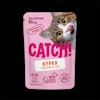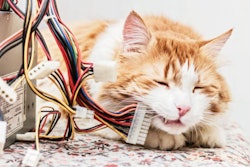A Purina survey found that nearly all kitten owners accurately identify their youngest cat as a kitten based on an age of less than 12 months, yet owners are divided on how long they believe cats are considered kittens. Knowing how long a cat is considered a kitten is crucial to ensure they receive all the nutrients needed for growth and development in their diet.
Among kitten owners who accurately identified their youngest cat as a kitten, 18% believe their cats are considered kittens for six months and 20% believe they are kittens for 12 months, with the remaining kitten owners scattered across a year.
"Cats are generally considered kittens for the first 12 months of their life and should be fed a kitten food for that year," said Dr. Callie Harris, DVM, veterinarian at Purina. "After a year, a kitten has matured into an adult cat and can be transitioned to adult food formulas. However, some larger breed cats, like the Maine Coon, may need to be fed kitten food for longer. I always recommend consulting your vet if you have specific questions about how long to feed kitten food."
The 2021 Kitten Owner Survey by Purina surveyed 1,000 kitten owners in the United States and discovered what kitten owners find most important when it comes to their pet's nutritional needs.
Among other key findings:
· Most owners (89%) believe feeding kitten food provides a head start to a lifetime of health
· Nearly all kitten owners (65%) believe kitten-specific food is important; however, due to the split in belief of how long a cat is considered a kitten, there's a divide on how long they believe it should be used for
· Nearly all kitten owners (96%) believe it's important their kitten enjoys the food given to them and 91% believe the food they feed their kitten will impact their health throughout their life.
The survey also helped owners learn more about their kitten's preferences when it comes to dinnertime:
· While the majority of kitten owners prefer dry food (30%) or a combination of dry and wet food (28%), kittens tend to prefer wet food (26%)
· Nearly half of owners (48%) compromise by feeding their kittens a mixture of wet and dry food
· Most owners (91%) are open to the idea of including variety in their kitten's diet, and 81% of owners believe that introducing their kitten to different foods will make them less picky in the future
· Those with more than one cat are likely to provide variety for their kitten if they do for their other cats (85%)
"In feeding kittens a diet comprised of different flavors and textures, their owners are also helping them develop their palates and preventing them from exclusively preferring a single type of food over time," said Dr. Annie Valuska, Ph.D., senior feeding behavior expert at Purina. "The more variety in a kitten's diet, the more adaptable they will be to diet changes when they get older."
Visit Purina.com/kitten














